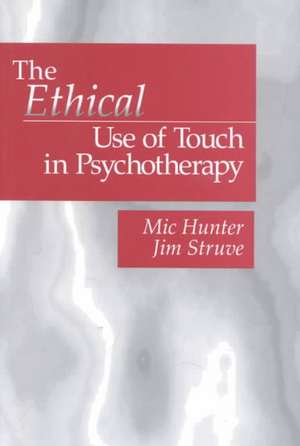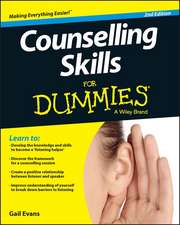The Ethical Use of Touch in Psychotherapy
Autor Michael G. Hunter, Jim Struveen Limba Engleză Paperback – 19 noi 1997
Is the bias against touch in psychotherapy justified? Is ethical touch an oxymoron? Can the recovery process be complete without healing touch? Mental health professionals are entrusted with the awesome responsibility of providing appropriate treatment for clients in a safe environment that nurtures trust, a necessary ingredient for optimum movement through the therapeutic process. Though treatment approaches vary, most modalities are verbally based and, in theory, exclude physical contact. Fearing that any form of touch would likely lead to sexual feelings or interaction, clinicians tend to shy away from the topic. In this book, however, Mic Hunter and Jim Struve skilfully demonstrate that touch - a most basic human need - is intrinsic to the healing process along with talk-therapy, regardless of the practitioner's theoretical orientation.
While the use of touch is a given in other health care settings, it remains a benefit denied as taboo in psychotherapeutic relationships, due to transgressors whose unscrupulous use of a valuable technique have marred its reputation. This book, which is based on years of sound research and clinical experience, encourages readers to conduct a meaningful self-reflection and explore possible misconceptions related to touch in order to rejuvenate its acceptance.
| Toate formatele și edițiile | Preț | Express |
|---|---|---|
| Paperback (1) | 557.56 lei 6-8 săpt. | |
| SAGE Publications – 19 noi 1997 | 557.56 lei 6-8 săpt. | |
| Hardback (1) | 847.88 lei 6-8 săpt. | |
| SAGE Publications – 25 noi 1997 | 847.88 lei 6-8 săpt. |
Preț: 557.56 lei
Preț vechi: 655.96 lei
-15% Nou
Puncte Express: 836
Preț estimativ în valută:
106.70€ • 115.86$ • 89.63£
106.70€ • 115.86$ • 89.63£
Carte tipărită la comandă
Livrare economică 23 aprilie-07 mai
Preluare comenzi: 021 569.72.76
Specificații
ISBN-13: 9780761903611
ISBN-10: 0761903615
Pagini: 319
Ilustrații: black & white illustrations
Dimensiuni: 152 x 232 x 21 mm
Greutate: 0.47 kg
Ediția:New.
Editura: SAGE Publications
Colecția Sage Publications, Inc
Locul publicării:Thousand Oaks, United States
ISBN-10: 0761903615
Pagini: 319
Ilustrații: black & white illustrations
Dimensiuni: 152 x 232 x 21 mm
Greutate: 0.47 kg
Ediția:New.
Editura: SAGE Publications
Colecția Sage Publications, Inc
Locul publicării:Thousand Oaks, United States
Cuprins
PART ONE: FOUNDATIONS AND HISTORICAL BACKGROUND
The Physiology of Touch
The Influence of Touch on Socialization
Traditions of Touch within Various Cultures
Traditions of Touch in Psychotherapy
PART TWO: CLINICAL APPLICATION OF TOUCH IN PSYCHOTHERAPY
Power Dynamics that Affect the Use of Touch in Therapy
Functions of Touch in Psychotherapy
The Dynamics of Touch When Applied in Psychotherapy
Guidelines for Using Touch in Psychotherapy
A Continuum of Touch
Specific Techniques and Case Examples Involving the Use of Touch
The Use of Touch in Various Modalities and with Specific Populations
The Use of Bodyworkers as an Adjunct to Psychotherapy
PART THREE: MATERIALS AND TRAINING AIDS
Erotic Issues within the Psychotherapy Relationship
Examining Personal Views on the Use of Touch in Psychotherapy
The Physiology of Touch
The Influence of Touch on Socialization
Traditions of Touch within Various Cultures
Traditions of Touch in Psychotherapy
PART TWO: CLINICAL APPLICATION OF TOUCH IN PSYCHOTHERAPY
Power Dynamics that Affect the Use of Touch in Therapy
Functions of Touch in Psychotherapy
The Dynamics of Touch When Applied in Psychotherapy
Guidelines for Using Touch in Psychotherapy
A Continuum of Touch
Specific Techniques and Case Examples Involving the Use of Touch
The Use of Touch in Various Modalities and with Specific Populations
The Use of Bodyworkers as an Adjunct to Psychotherapy
PART THREE: MATERIALS AND TRAINING AIDS
Erotic Issues within the Psychotherapy Relationship
Examining Personal Views on the Use of Touch in Psychotherapy
Descriere
Is the bias against touch in psychotherapy justified? Is ethical touch an oxymoron? Can the recovery process be complete without healing touch? Mental health professionals are entrusted with the awesome responsibility of providing appropriate treatment for clients in a safe environment that nurtures trust, a necessary ingredient for optimum movement through the therapeutic process. Though treatment approaches vary, most modalities are verbally based and, in theory, exclude physical contact. Fearing that any form of touch would likely lead to sexual feelings or interaction, clinicians tend to shy away from the topic. In this book, however, Mic Hunter and Jim Struve skilfully demonstrate that touch - a most basic human need - is intrinsic to


















